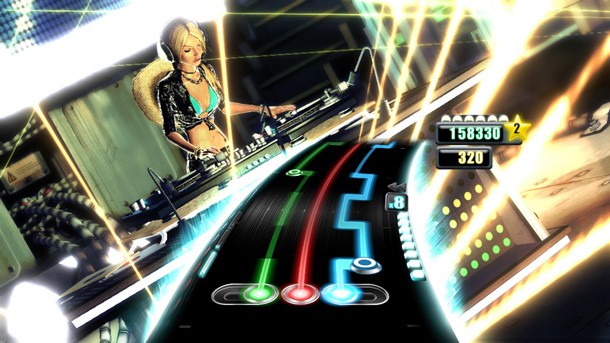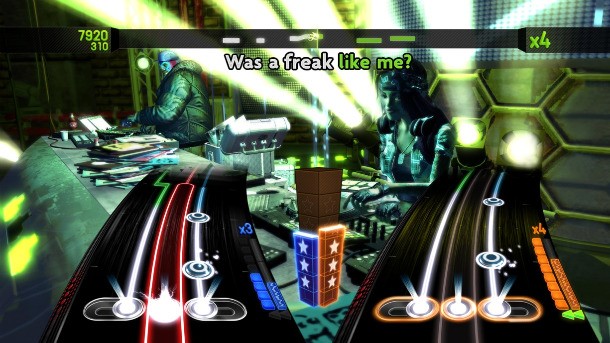DJ Hero Deserved Better

Freestyle Games' DJ Hero series had just what the music genre needed: unique gameplay, a cool turntable peripheral, and an infusion of fresh beats from the worlds of dance music and hip-hop. Unfortunately, it was doomed by circumstance and a glut of guitar games.
When the original DJ Hero released in 2009, I reviewed it for Game Informer. Here's the opening paragraph, words that still ring true for me:
Activision has taken a lot of heat in gamer circles for its perceived shameless exploitation of the Guitar Hero franchise. A lot of gamers have been more sympathetic to Harmonix (the originators of both Guitar Hero and Rock Band), a stance reinforced by the company's classy handling of its DLC catalog and The Beatles: Rock Band, especially in contrast to Activision's botched handling of Kurt Cobain's likeness in Guitar Hero 5. Against this backdrop, DJ Hero is an even more impressive feat of game development. Not only does it succeed in being much more than a cheap cash-in on the "Hero" brand, it's the most innovative and inspired new music title since the original Rock Band.
I gave the game a 9/10, a score I stand by. For me, someone who's been a lifelong fan of both rock and hip-hop, it was refreshing to play a game that was able to take the basic "falling note" gameplay of Guitar Hero and completely reconfigure it for a new controller and different styles of music. While playing Guitar Hero, and later Rock Band, at parties will forever be some of my favorite gaming moments, by 2009 the formula was beginning to grow stale. There was only so much that could be done with the guitar controller, and both Neversoft and Harmonix were beginning to butt heads with the cold reality that, frankly, outside of signing deals with iconic bands like the Beatles and Metallica, there wasn't much that could be added.
DJ Hero, on the other hand, could offer fans a type of gameplay that they hadn't experienced before, in genres that Guitar Hero and Rock Band couldn't touch. The DJ Hero controller, which featured three buttons on a rotating turntable plus a knob for assigning various effects, allowed the user to mix together tracks, samples, and scratches into a musical experience that felt very similar to a real DJ set. In fact, it's not far off from what many real DJs use today. Programs like Serato allow DJs to mix and cut MP3s with real turntables or turntable-style controllers that are like more complex versions of the DJ Hero turntable.
Musically, the game was more exciting than any previous games in the genre. While Harmonix in particular always had a great ear for picking tracks that were both engaging to listen to and fun to play in Rock Band, in DJ Hero you were hearing custom-created mash-ups of songs both unknown and familiar - giving you the illusion that you weren't just recreating something, but creating it in the mix. Here's another excerpt from my original DJ Hero review:
Familiar tracks are blended with obscure DJ cuts to often thrilling results. In DJ Hero, the delicate '60s psych of the Zombies is melded with Chuck Brown's go-go classic "Bustin' Loose," while jazz producer David Axelrod gets down with Eric B. and Rakim's hip-hop epic "Eric B. is President." Finally, a music game that's not simply regurgitating the past, but transforming it. While the mixes sometimes rely too heavily on pop hits or well-known artists, the soundtrack feels remarkably true to the cut-and-paste aesthetic of DJ culture.
DJ Hero released in 2009, a year which saw a glut of new releases in the music genre. Activision released four separate Guitar Hero titles that year: Guitar Hero: Metallica, Guitar Hero: Smash Hits, the pop-themed Band Hero, and Guitar Hero: Van Halen. Add to the mix Harmonix's much-hyped The Beatles: Rock Band, and you had a veritable deluge of choices for the music game consumer. An innovative game like DJ Hero - which had to be sold for a higher price due to the new controller - had little chance of competing.

Still, to Activision's credit, the publisher took note of the game's strong reviews and potential and gave Freestyle the go-ahead to make DJ Hero 2. The game was also given a bigger budget and a bigger push towards signing high profile artists like Eminem, Jay-Z, and Dr. Dre. They also signed popular DJs like David Guetta, Deadmau5, DJ Qbert, Tiesto, and RZA to be playable characters. In addition to a big marketing campaign, Activision promoted the game with a concert for industry insiders and the press at E3, which featured performances by Jay-Z and Eminem.
Freestyle responded by delivering a game that was even better than the first. It took what was good about DJ Hero and expanded it with new freestyle scratching and crossfading track sections, which upped the creativity that players could exercise during a mix. It also improved the usage of the middle button on the turntable, which had previously been used to deliver cheesy catchphrases or sound effects, by creating sounds unique to each mix that could be incorporated in a more elegant fashion. Add in a bigger and more diverse soundtrack, and you had a sequel that improved on its predecessor in many important ways. In my review, I scored the game a 9.25/10, saying:
As you crossfade, scratch, and manipulate the gorgeous mixes, the feeling is akin to riding the perfect wave. In some ways, I almost feel a greater connection to the music than I do when playing the guitar-focused games on the market. Hopefully this game will meet the success it deserves, allowing FreeStyle Games to keep searching for that perfect beat.
Sadly, it wasn't to be. The game released in October of 2010 to first-month sales of only 59,000 units. Activision later revealed that DJ Hero 2 and Guitar Hero: Warriors of Rock combined for sales of less than 1 million, off 63 percent from Activision's music game portfolio (Guitar Hero 5, DJ Hero, and Band Hero) in the previous year. A few months later, it was all over; in January of 2011, Activision Publishing CEO Eric Hirshberg revealed to investors during a conference call the DJ Hero franchise was being shutdown as part of a company restructuring that cut over 500 jobs.
It was a sad end to what should have been a new chapter for the music game genre. Personally, I feel that DJ Hero still has a lot to offer gamers. If you haven't played one of these games before, I encourage you to do so.
As for what lessons we've learned, I'm not sure there is an easy answer. The truth is that, by time DJ Hero hit the market, the writing was already on the wall for the music genre. With two companies, Activision and Harmonix, flooding the market with games and expensive peripherals, selling yet another expensive music game and expensive controller - no matter how innovative - wasn't an easy task. While many will point the blame at Activision for its glut of product, I think the company did its best with DJ Hero. It certainly gave Freestyle the budget and marketing push it deserved, and approved a bigger budget for DJ Hero 2 even after the first game failed to light the world on fire. But at the end of the day, you can't force people to buy something. Sometimes, bad luck and poor circumstances are obstacles that can't be overcome.
Still, Freestyle deserves credit for its work. The developer managed to bring whole new genres of music into the world of games, designed an excellent new controller and gameplay mechanics, and added a lot of creativity and invention to the formula created by Harmonix. The games themselves are still out there online and in used game stores; the quality speaks for itself.









